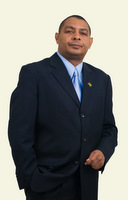This is David Geddes, chair of the Institute for Public Relations Commission on Measurement and Evaluation. Government agencies and public sector organizations face particular challenges in communicating with stakeholder audiences, and in measuring and evaluating their communications.
 Today I am talking with another David Geddes —yes, it is true—who is Secretary to the Office and Director of Utility Monitoring at the Office of Utilities Regulation in Jamaica. Previously, David was Director of Consumer and Public Affairs at the Office of Utilities Regulation in Jamaica, and before that a print and broadcast journalist.
Today I am talking with another David Geddes —yes, it is true—who is Secretary to the Office and Director of Utility Monitoring at the Office of Utilities Regulation in Jamaica. Previously, David was Director of Consumer and Public Affairs at the Office of Utilities Regulation in Jamaica, and before that a print and broadcast journalist.
David, tell us about your role and responsibilities as head communicator for a government utilities regulator.
There is perhaps no more challenging job than communicating with the diverse stakeholders of a utility regulator. Regulators across the world like to surmise that they have probably done a good job when all the stakeholders are unhappy with them. The Office of Utility Regulation’s main stakeholders are the government, utility companies and utility customers. Of course there are other stakeholders such as the media and staff.
That having been said, it is critical to establish and maintain credible lines of communication with all stakeholders. Over the past ten years I have found that utilizing different media channels converges efforts to achieve the communication objective.
The Office of Utility Regulation is required to consult before arriving at and publishing any decisions. These consultations take different forms. However I am committed to the face to face meetings. These I believe help to create trust, reinforce the foundations on which stakeholder relations are built.
Jamaica is a relatively small island, and when there is a tariff review (approximately every five years for both electricity and water) the Office of Utility Regulation team organizes town hall type meetings in the different parishes usually using a school, church hall or hotel. These meetings afford citizens an opportunity to pose questions to the regulator as well as the utility company seeking the tariff review.
I usually chair these meetings and also have them videotaped so that excerpts can be broadcast on television and radio.
Additionally I encourage community groups to invite the Office of Utility Regulation to speak at their events, in fact in one year I attended and spoke at more than two hundred events. These are wonderful opportunities to interact, deliver presentations and get feedback in the form of questions and comments.
Advertising has traditionally been a major challenge for the Office of Utility Regulation. Its staid, conservative posture does not lend itself easily to engaging advertisements. On the contrary, the tradition has been to use formal public notices irrespective of the message and the target audience.
In Jamaica there is widespread distrust of the billing systems of the utility companies. This includes a fervent belief that the meters are not functioning properly, and that the malfunctioning meters overcharge consumers.
More than seventy percent of the complaints that come to the Office of Utility Regulation are about billing matters. When surveys are undertaken, these inevitably indicate that customers do not trust the utility companies.
Whereas in some societies the ”conspiracy theory” relates to the government, in Jamaica in relates to the utility companies and their billing system.
The Office of Utility Regulation is mandated to deal with appeals, that is, the customer should first raise the complaint with the utility company, and if the complaint is not resolved to their satisfaction it may be brought to the Office of Utility Regulation as an appeal.
On average, about sixty to seventy percent of the cases resolved by the Office of Utility Regulation are resolved in favour of the utility company. This can be viewed two ways, one is that the utility companies acted according to legislation and regulatory directives in the first place, or that the Office of Utility Regulation “sides” with the utility companies. It is the latter interpretation that many customers choose to hold to.
This despite the analogy of appeals courts ruling in favour of the lower courts more often than not. If a majority of the cases were overturned on appeal it would indicate that something is wrong with the system, well certainly at the level of the lower courts anyway.
What role does research among your stakeholders or publics play in developing your communications strategy and tactics and in evaluating your results?
Research is critical to formulating any communication strategy. At the Office of Utility Regulation we have conducted focus groups and national surveys that inform us on many things including how consumers wish to receive information from us.
Unfortunately this does not always inform our choices for a variety of reasons, chief among them financial constraints or perceived financial constraints. The Office of Utility Regulation has in recent times cut back on two programmes that were always touted by consumers as the most effective means of communicating with them: television and town hall meetings. These, of course, are the two most costly components of the Public Education budget.
Surveys and focus groups have informed the message that is communicated to the stakeholders and how that message is crafted. The Communication programme is measured by surveys at different levels. Internally, the complaints and appeals received are matched against the parishes that have been the target of outreach programmes on a quarterly basis.
Externally, focus groups are asked to review the programme and the feedback is used to adjust the message and or the medium.
Once every two years a national survey is also undertaken and the results used to realign Office of Utility Regulation’s messages with appropriate media.
Additionally the attendance at town hall meetings is measured and what has been found is that when town criers are used coupled with the distribution of fliers promoting the meetings the attendance is also higher. So these tools are now standard implementing mechanisms.
Initially town hall meetings were promoted exclusively by media (print and electronic) advertising.
What key performance metrics does you senior staff look for? Do you have any practical tips for communicating PR measurement results to senior government officials?
Over the years I have found that government officials, especially those elected, relate quite easily to numbers of persons. It is also usually best to keep reports short and insert a matrix. Once as an editor I was working against a deadline and had to make a decision on what should be the lead story. The deputy head of the news department was working on a story and had already submitted two pages, I made the decision that his story would not be the lead. He became upset arguing that I had made a decision without all the facts (the entire story!). Well, the head of the news department intervened and quite rightly noted that if the editor (me) had two pages of the story but did not have the most important facts of the story, then the writer needed to find a new job!
Tell us about your year as a Hubert Humphrey Fellow at the Evans School of Public Affairs at the University of Washington.
One of the most fascinating years of my life! It afforded me an opportunity to focus on studies and internships at a pace that suited me. It was extremely rewarding and allowed me to establish relationships with several people from a diverse cultural background. It reinforced the principles of tolerance. What was interesting also was this was the first time in my life that I was part of a group for an extended period of time where as a native English speaker I was a minority!
The Evans School and the University of Washington as a whole provided an environment for learning and utilizing cutting edge technology. I was also privileged to serve as a judge in the highly acclaimed Foster Business School’s Global Social Entrepreneurship Competition.The Fulbright Programme is an outstanding testimony to effective diplomacy and global understanding and tolerance.
Our campus Coordinator Alix Furness ensured that as Humphrey Fellows we had the freedom to configure the programme to suit our individual needs.
Thanks for talking with us today. Please stop by for future installments of Five Minute Conversations, or read past interviews at https://instituteforpr.org/blog/.



